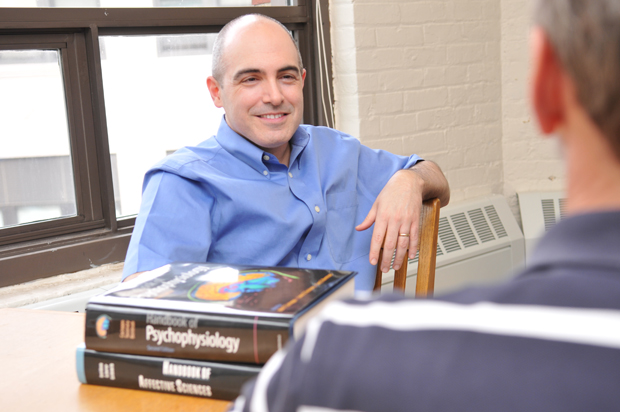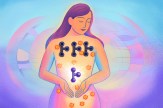The scales of human morality

“In reality, we rationalize. We deny, or we couldn’t go on living,” says Judah Rosenthal, the successful ophthalmologist whose perfect life begins to unravel in Woody Allen’s 1989 film, “Crimes and Misdemeanors.” In order to go on living, Rosenthal must rationalize the series of risky and uncharacteristic decisions that nearly destroy him.
Discussing the Allen film with a packed audience at the Coolidge Corner Theatre’s Science on Screen event on Monday night, David DeSteno, associate professor of psychology in the College of Science, asked, “Why do any of us sometimes act in ways that surprise ourselves…ways that, quite frankly, are out of character?”
The Science on Screen events pair film screenings with introductions by notable figures from the world of science, technology and medicine. The films serve as an opportunity for the speakers to discuss current scientific research or technological advances.
“Crimes and Misdemeanors” served as a chance to explore research on character. The standard view of character takes a black-and-white approach, in which the seven deadly sins will lead one to a life of misery and the seven heavenly virtues will make for a happy, successful person.
But is pride always bad? Is chastity always good? DeSteno noted that pride can make us strive to gain resources, and chastity, if always adhered to, would mean the extinction of our species.
“The problem with this,” DeSteno said, “is that it logically doesn’t add up. … If you’re a bad guy and you do something good, that’s an aberrant event. But if you’re a good guy and you do something bad, it’s a window to your true soul. As a scientist I just cannot accept that.”
DeSteno proposed a more flexible idea of human moral behavior. Instead of a scale balanced between good and evil, perhaps virtue is flanked by two opposing desires: what’s good for us now versus what’s good for us in the long-term.
With support from the National Science Foundation, DeSteno studies human character in the lab. For example, to explore hypocrisy, he asks participants to judge the fairness of their own behavior and that of another in the same task. Even when the two behaviors are identical, participants consistently judge others more harshly.
While Judah Rosenthal initially cannot fathom the idea of killing his mistress to preserve his own virtuous life, he eventually rationalizes it. We often judge others for their immoral choices, DeSteno said, but when faced with the same circumstances can we be certain we’d act more honorably?
“We assume someone who is sleazy is never going to be good,” he said. “We assume someone who is trustworthy is never going to be bad and when they are, it surprises us.” But if we can accept a more variable idea of character, we can understand “the forces that turn saints into sinners and cowards into heroes.”





